#prison history
Text
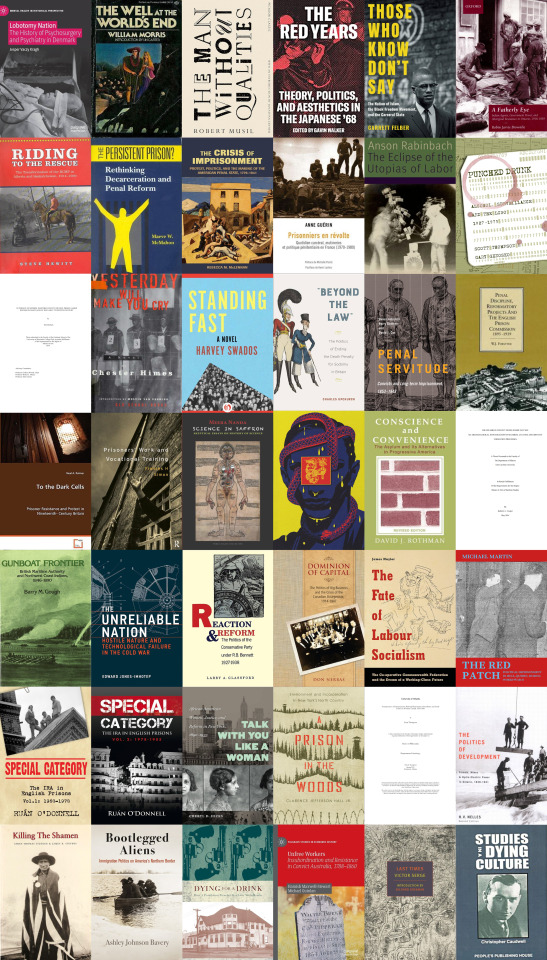
BOOKS I READ IN 2023
Here's what I read in 2023. What has now become an annual tradition of sorts!
An unusual year in reading for me. The first half of the year was very slow, and I mostly finished two long books I've been trying to finish for years by William Morris and Robert Musil. Then the PSAC strike, and more time to read. After that, I made a reading plan and stuck to it, trying to read every day at least a chapter of a book on the list. I also ended up re-reading several books this year - transcribing notes at first, I ended up going over the entire book a second time. I also tried to take extensive notes on every new book. I also snuck a few theses I read onto the list - it feels weird not to include a several hundred page work I went over with a fine-toothed comb. Mostly academic books, germane to my own research and writing, but some strong forays into topics I don't normally think about much. Plus some genuinely good 'amateur' history, too.
Re-reads are marked by a plus sign and my most enjoyable or interesting reads are marked with an asterisk.
First Row:
Jesper Vaczy Kragh, Lobotomy Nation: The History of Psychosurgery and Psychiatry in Denmark (2021)
William Morris, The Well at the World's End (1896, Ballantine edition 1975)
Robert Musil, translated by Sophie Wilkins, The Man Without Qualities (1930, Picador edition 2017)*
Gavin Walker, ed., The Red Years: Theory, Politics, and Aesthetics in the Japanese ’68 (2020)*
Garrett Felber, Those Who Know Don't Say: The Nation of Islam, the Black Freedom Movement, and the Carceral State (2020) *
Robin Jarvis Brownlie, A Fatherly Eye: Indian Agents, Government Power, and Aboriginal Resistance in Ontario, 1918-1939 (2003)
Second Row:
Steve Hewitt, Riding to the Rescue: The Transformation of the RCMP in Alberta and Saskatchewan, 1914-1939 (2006)
Maeve McMahon, The Persistent Prison?: Rethinking Decarceration and Penal Reform (1989)+
Rebecca McLennan, The Crisis of Imprisonment: Protest, Politics, and the Making of the American Penal State, 1776–1941 (2007)+
Anne Guérin, Prisonniers en révolte: Quotidien carcéral, mutineries et politique pénitentiaire en France (2013)+
Anson Rabinbach, The Eclipse of the Utopias of Labor (2018)
Scott Thompson & Gary Genosko, Punched Drunk: Alcohol, Surveillance and the LCBO, 1927-1975 (2009)
Third Row:
Erin Durham, "In Pursuit of Reform, Whether Convict or Free: Prison Labor Reform in Maryland in the early Twentieth Century." (2018 thesis)
Chester Himes, Yesterday Will Make You Cry (1998)*
Harvey Swados, Standing Fast: A Novel (1971, 2013 Open Road edition)
Charles Upchurch, "Beyond the Law": The Politics of Ending the Death Penalty for Sodomy in Britain (2021)
Barry Godfrey, David J. Cox & Helen Johnston, Penal Servitude: Convicts and Long-Term Imprisonment, 1853–1948 (2022)
W.J. Forsythe, Penal Discipline, Reformatory Projects And The English Prison Commission, 1895-1939 (1991)
Fourth Row:
Neal A. Palmer, To the Dark Cells: Prisoner Resistance and Protest in Nineteenth-Century Britain (2008)
Frances H. Simon, Prisoners' Work and Vocational Training (1999)
Meera Nanda, Science In Saffron: Skeptical Essays On History of Science (2016)*
Gene Wolfe, The Book of the New Sun (four volumes, 1980-1983, Folio Society edition 2021)+
David J. Rothman, Conscience and Convenience: The Asylum and Its Alternatives in Progressive America (2002)+
Kathryn Cooper, "The Infamous Convict Museum Ship Success : an Archaeological Investigation of Material Culture and Identity Formation Processes." (2014 thesis)
Fifth row:
Barry M. Gough, Gunboat Frontier: British Maritime Authority and Northwest Coast Indians, 1846-1890 (1984)
Edward Jones-Imhotep, The Unreliable Nation: Hostile Nature and Technological Failure in the Cold War (2017)*
Larry A. Glassford, Reaction and Reform: The Politics of the Conservative Party under R.B. Bennett, 1927-1938 (1992)
Don Nerbas, Dominion of Capital: The Politics of Big Business and the Crisis of the Canadian Bourgeoisie, 1914-1947 (2013)
James Naylor, The Fate of Labour Socialism: The Co-operative Commonwealth Federation and the Dream of a Working-Class Future (2016)
Michael Martin, The Red Patch: Political imprisonment in Hull, Quebec during World War 2 (2007)
Sixth Row:
Ruán O'Donnell, Special Category: The IRA in English Prisons, Vol. 1: 1968-1978 (2012)*
Ruán O'Donnell, Special Category: The IRA in English Prisons, Vol. 2: 1978-1985 (2015)*
Cheryl D. Hicks, Talk with You Like a Woman: African American Women, Justice, and Reform in New York, 1890-1935 (2010)*
Clarence Jefferson Hall, A Prison in the Woods: Environment and Incarceration in New York's North Country (2020)
Scott Thompson, "Consequences of Categorization: National Registration, Surveillance and Social Control in Wartime Canada, 1939-1946." (2013 thesis)
H.V. Nelles, The Politics of Development: Forests, Mines, and Hydro-Electric Power in Ontario, 1849-1941 (2005)+
Seventh row:
Chief Thomas Fiddler & James R. Stevens, Killing the Shamen (1985)
Ashley Johnson Bavery, Bootlegged Aliens: Immigration Politics on America's Northern Border (2020)
Patrick Brode, Dying for a Drink: How a Prohibition Preacher Got Away with Murder (2018)
Hamish Maxwell-Stewart & Michael Quinlan, Unfree Workers: Insubordination and Resistance in Convict Australia, 1788-1860 (2022)*
Victor Serge, translated by Ralph Manheim, Last Times (1946, 2022 NYRB edition)
Christopher Cauldwell, Studies in a Dying Culture (1938)
#books#reading#books 2023#year end list#2023 reading list#canadian history#prison history#academic quote#academic research#academic books#australian history#british history
6 notes
·
View notes
Text
one of the funniest news things in canada that always tickles me is the ongoing war between magic mushroom shops and the police.




this is the absolute height of humour to me right now
#tw drugs#lovingly cracking open a news paper just for the articles about dispensaries trolling the police#making drugs illegal has literally never ONCE in history worked#decriminalize it so we can stop overpaying useless cops to go on raids#offer SAFE AND CLEAN GOVERNMENT INSPECTED drugs like how we do with weed#stop the street drug deaths. tax them towards healthcare and social services and fucking UBI already#have the harder drugs harder to access along with on site support. no one WANTS to be stuck on meth#but ruining their lives in prison has helped approximately no one#jj stuff
1K notes
·
View notes
Text
Today marks the 17th of April, which is Palestinian prisoner day…
on such an occasion we wish for all of our innocent and beloved detainees and prisoners who have been put (without a charge, or because of wrongful and false accusations) inside the occupation’s prisons to very soon be released, to be able to experience life between us as it is and to gain back their freedom that they have been deprived from for months, if not even years or decades.
we wish that in a few years, when it is again the 17th of April, we’ll be looking back at this day and date in a Free Palestine while telling these stories of detainment and imprisonment as something of the past that will never bother us or come upon our lives to ruin them ever again.
on this day, we wish for the mothers, fathers, husbands, wives, daughters, sons, grandchildren and friends of those imprisoned to have endless amounts of patience, faith and hope until their loved ones are released.
الحرّية لأسرى الحرّية 🍉

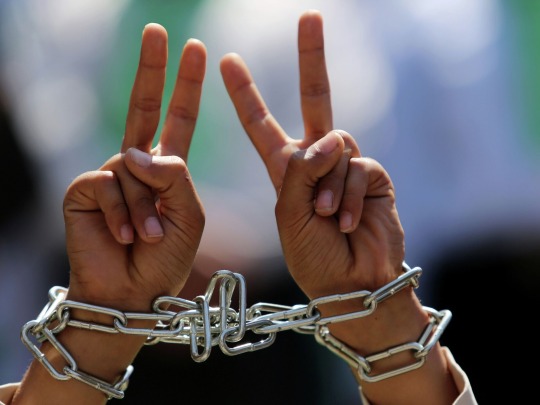

For Historical Context : The Palestinian National Council chose April 17 as Palestinian Prisoner’s Day in 1974 because it was the date that Mahmoud Bakr Hijazi was released in the first prisoner exchange between Israel and Palestine in 1971.
#palestine#palestinian prisoner day#falasteen#free 🍉#palestine 🍉#🍉#palestinian lives matter#walid daqqa#from the river to the sea palestine will be free#stand with palestine#long live palestine#palestine solidarity#from the river to the sea 🇵🇸#i stand with palestine 🇵🇸#free palestine 🇵🇸#freedom#save palestine#palestina#end the genocide#end the apartheid#end the siege#don’t stop talking about palestine#stop palestinian genocide#stop the occupation#stop the genocide#stop israel#anti zionisim#palestinian history#free falasteen#tag: important
633 notes
·
View notes
Text
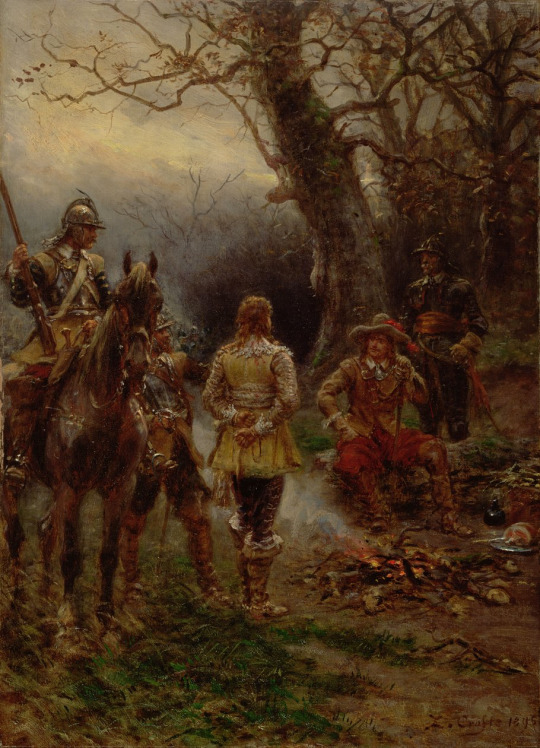
Oliver Cromwell Questioning a Prisoner by Ernest Crofts
#oliver cromwell#art#ernest crofts#english civil war#england#prisoner#cavalier#royalist#roundheads#royalists#parliamentarians#parliamentarian#cavaliers#history#war#britain#europe#english#british#civil war#parliament#monarchy#fire#camp#campfire
132 notes
·
View notes
Text

German soldiers captured by US soldiers at Coutances, France 1944
#world war two#ww2#worldwar2photos#history#1940s#ww2 history#wwii#world war 2#wwii era#ww2history#normandy#1944#normandy landings#pow#prisoner of war#prisoner
117 notes
·
View notes
Text
What an incredible voyage through history as over 100 love letters from the 18th century have finally been opened! Penned over 250 years ago, these letters offer an extraordinary window into the lives of French Navy sailors and their loved ones.
195 notes
·
View notes
Text
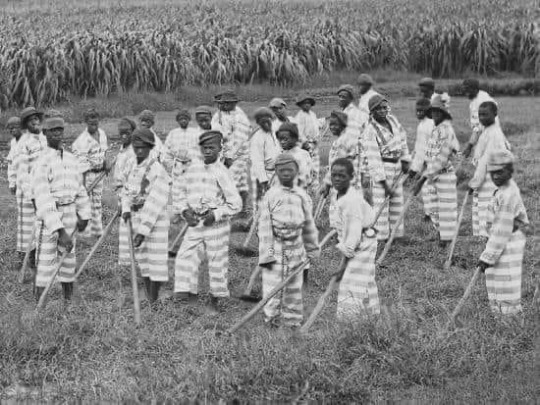
IF YOU DIDN'T KNOW THIS YESTERDAY THEN TODAY WOULD BE A GOOD DAY TO LEARN THIS.... "All stories don't have a happy ending"
In 1866, one year after the 13 Amendment was ratified (the amendment that ended slavery), Alabama, Texas, Louisiana, Arkansas, Georgia, Mississippi, Florida, Tennessee, and South Carolina began to lease out convicts for labor (peonage). This made the business of arresting Blacks very lucrative, which is why hundreds of White men were hired by these states as police officers. Their primary responsibility was to search out and arrest Blacks who were in violation of Black Codes. Once arrested, these men, women and children would be leased to plantations where they would harvest cotton, tobacco, sugar cane. Or they would be leased to work at coal mines, or railroad companies. The owners of these businesses would pay the state for every prisoner who worked for them; prison labor.
It is believed that after the passing of the 13th Amendment, more than 800,000 Blacks were part of the system of peonage, or re-enslavement through the prison system. Peonage didn’t end until after World War II began, around 1940.
This is how it happened.
The 13th Amendment declared that "Neither slavery nor involuntary servitude, except as a punishment for crime whereof the party shall have been duly convicted, shall exist within the United States, or any place subject to their jurisdiction." (Ratified in 1865)
Did you catch that? It says, “neither slavery nor involuntary servitude could occur except as a punishment for a crime". Lawmakers used this phrase to make petty offenses crimes. When Blacks were found guilty of committing these crimes, they were imprisoned and then leased out to the same businesses that lost slaves after the passing of the 13th Amendment. This system of convict labor is called peonage.
The majority of White Southern farmers and business owners hated the 13th Amendment because it took away slave labor. As a way to appease them, the federal government turned a blind eye when southern states used this clause in the 13th Amendment to establish laws called Black Codes. Here are some examples of Black Codes:
In Louisiana, it was illegal for a Black man to preach to Black congregations without special permission in writing from the president of the police. If caught, he could be arrested and fined. If he could not pay the fines, which were unbelievably high, he would be forced to work for an individual, or go to jail or prison where he would work until his debt was paid off.
If a Black person did not have a job, he or she could be arrested and imprisoned on the charge of vagrancy or loitering.
This next Black Code will make you cringe. In South Carolina, if the parent of a Black child was considered vagrant, the judicial system allowed the police and/or other government agencies to “apprentice” the child to an "employer". Males could be held until the age of 21, and females could be held until they were 18. Their owner had the legal right to inflict punishment on the child for disobedience, and to recapture them if they ran away.
This (peonage) is an example of systemic racism - Racism established and perpetuated by government systems. Slavery was made legal by the U.S. Government. Segregation, Black Codes, Jim Crow and peonage were all made legal by the government, and upheld by the judicial system. These acts of racism were built into the system, which is where the term “Systemic Racism” is derived.
This is the part of "Black History" that most of us were never told about.
400 notes
·
View notes
Text





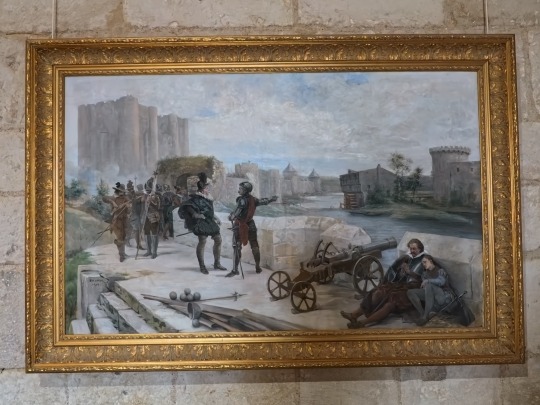

















Exploration du donjon de Niort : une ancienne prison
Vidéo:
youtube
#visite#donjon#chateau#prison#touristique#tourisme_niort#histoire_niort#decouverte_niort#niort#explorationintrigante#tourism#france#exploration#youtube#photography#explore#histoire#historic#history#tourisim#Youtube
77 notes
·
View notes
Text
“In 1931, penologist Louis Robinson asked a disarmingly direct question with the title of his book: should prisoners work? Robinson’s rhetorical device did not suggest the author’s uncertainty regarding his argument. An experienced criminologist at Swarthmore College, Robinson knew what he thought, and was out to persuade his readers. Like any good scholar, he adroitly utilized sources and statistics, and advanced his case methodically. But Robinson also knew that his subject matter was controversial, vexing, and even paradoxical. It did not lend itself to easy answers and ultimate solutions — no periods or explanation marks would do. On the contrary, the propriety of prison labor had inflamed and eluded the best thinking of lawmakers, businesspeople, judges, moralists, reformers, and ordinary workers since the origins of the republic.
Robinson’s question, then, was straightforward but sneaky. Surely prisoners, who had broken society’s laws and violated the social contract, deserved punishment. Most ordinary citizens viewed prison labor in this light, Robinson averred, “as old as the story of Adam, on whom God laid the penalty of work for disobedience.” Indeed, work had been considered essential to the penitentiary ever since the opening of the first modern prisons in the 1820s. At Pennsylvania’s Eastern State Penitentiary and New York’s Auburn Prison, America’s first penologists anticipated, in the words of historian David Rothman, that prison labor “would become not an oppressive task for punishment, but a welcome diversion, a delight rather than a burden.” Work would rehabilitate the law breaker and prepare him to rejoin productive society. These pioneering penitentiaries created small-scale factories within prison walls, hoping the discipline of labor would make inmates choose to be productive citizen-workers on their return to freedom.
Behind this benevolent scrim, however, the question of convict labor involved a thicket of political, economic, and moral conundrums. While penologists and criminologists claimed a legitimate interest in reforming criminals through work, the inescapable fact that prisoners’ labor was unpaid, often coerced, and frequently served the financial interest of private manufacturers effectively transformed the convict into a kind of slave — an analogy made even by prison officials such as New York’s Thomas Osborne. The fact that so many convict workers following the Civil War were African Americans, and that crime itself became so insidiously tied to white fears of blackness, underscored the exploitive and illiberal essence of prison labor in a society premised on contract freedom.”
- Matthew Pehl, “Between the Market and the State: The Problem of Prison Labor in the New Deal.” Labor: Studies in Working-Class History, Volume 16, Issue 2 (2019): p. 77-78.
#the new deal#the great depression#prison labor#convict labor#unfree labor#convict labour#penal reform#penologists#penology#american prison system#prison industrial complex#prison industries#prison history#united states history#history of crime and punishment#academic quote#academic research
2 notes
·
View notes
Text
Anyway returning to Lore Stuff but: feels really likely The Crush was due to Ludinus's attempt to contact Ruidus in the late 500s, which is what led to the fall of Molaesmyr. I wonder if he even realized until centuries later, since I don't think he was able to communicate with Ruidus until he started working with Ruidusborn which feels comparatively recent. Imagine unwittingly setting into motion a natural disaster that permitted the final stages of complete imperial takeover on an entirely different celestial body and then finding out 200-odd years later that this is extremely beneficial to your lifelong dreams.
#i really do understand the depths of his hubris because he keeps...not failing upward he is too smart to fail#but he keeps stabbing in the dark and hitting precisely the right thing. i do wonder if he orchestrated the eve of crimson midnight#timeline gets a bit wonky there due to Writers Doing Math#or if he was just a clever opportunist#critical role spoilers#critical role#we really need to get more info about ludinus like. the choice to fixate on ruidus is in fact brilliant.#he could have taught liliana or two a thing given that he basically saw priests saying RUN and was like. bet.#but like...his notes in molaesmyr don't mention the people on the moon#just a sealed alien entity. did he know? did he think the moon was only a prison?#we ALSO need the actual history of ruidus. can chet just. touch the ground. can fcg cast legend lore
83 notes
·
View notes
Text
You're cool throws my neo trio+Giovanni at you




#i love how trixie turned out#epithet erased#art#ee#artists on tumblr#epithet erased prison of plastic#trixie roughouse#pheonica fleecity#molly epithet erased#Molly Blyndeff#trational art#traditional drawing#this is a doodle i did in English/history class
77 notes
·
View notes
Text
The Bard's Songs
Come away, O human child!
To the waters and the wild
With a faery, hand in hand,
For the world's more full of weeping
than you can understand.
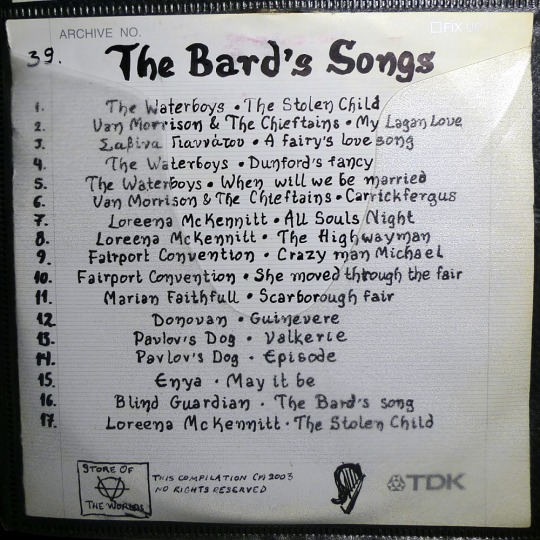
More than twenty years ago (well fuck me) I made a mixtape for our d&d campaign. That was when people used to burn audio CDs, and this was mixtape #39 (out of 271). I think I was playing an elf bard at the time.
I'm posting it here for posterity, for nostalgia, and as a snapshot of vanilla d&d lore/mood, as I experienced it back in the day. If it seems frightfully basic and predictable, well it was. Pretty much everything in that list is from Britain or Ireland or somehow evoking them. But hey, I ain't from there. It was exotic for me!
So it's vanilla and predictable, my little escapism soundtrack. And you know what else it is? A damn good compilation if I say so myself. "Fisherman's Blues" is one of best albums of all time, Loreena McKennitt is a genius, the Chieftains are giants, Pavlov's Dog are one of the few dad rock bands whose hits didn't age terribly, and hey, because I just listened to the whole thing again, when Enya stops singing "May it be" and the track continues with the Shire and the Fellowship leitmotifs, I am FULLY crying again, just bawling over here.
So here's to 2024, and the next 20 years of roleplaying, or as long as we got. Happy new year, everyone. Squeeze every drop out of life, and may your aim be true. The bard's songs will remain.
Tomorrow will take us away
Far from home
No one will ever know our names
But the bards' songs will remain
In my thoughts and in my dreams
They're always in my mind
These songs of hobbits, dwarves and men and elves
Come close your eyes
You can see them too
The Bard's Songs
The Waterboys - The Stolen Child [poem by W. B. Yeats, recited by Tomás Mac Eoin]
Van Morrison & The Chieftains - My Lagan love [trad. Irish]
Savina Yannatou - A fairy's love song [trad. Scottish, Hebrides]
The Waterboys - Dunford's fancy
The Waterboys - When will we be married? [trad.]
Van Morrison & The Chieftains - Carrickfergus [trad. Irish maybe]
Loreena McKennitt - All Souls Night
Loreena McKennitt - The highwayman [poem by Alfred Noyes]
Fairport Convention - Crazy man Michael
Fairport Convention - She moved through the fair [trad. Irish]
Marianne Faithfull - Scarborough Fair [trad. English]
Donovan - Guinevere (live)
Pavlov's Dog - Valkerie
Pavlov's Dog - Episode
Enya - May it be [LotR: The Fellowship of the Ring]
Blind Guardian - The Bard's song (In the forest)
Loreena McKennitt - The Stolen Child
This Compilation (P) 2003, Store of the Worlds, Inc. | No Rights Reserved
#trs#d&d history#yeap#prison ballads#mixtape#d&d#fluff#folk#for he comes! the human child#to the waters and the wild#with a faery hand in hand#from a world more full of weeping#than he can understand
103 notes
·
View notes
Text

Prison of Francis I by Giovanni Migliara
#francis i#prison#prisoner#spain#art#giovanni migliara#architecture#king#france#french#king of france#history#europe#european#françois i#habsburg#spanish#charles v#battle of pavia#medieval#middle ages#renaissance#royalty#royals#royal#nobility
199 notes
·
View notes
Text
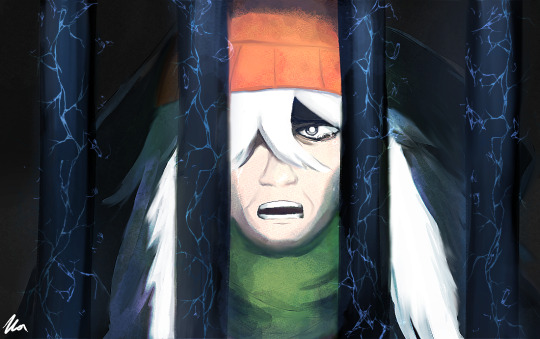
"Get the key back. It should not be used. Everything will vanish again. Do you want to know unending pain…like I have?"
#Pokemon xy#pokemon x and y#pokemon#pokemon fanart#my art#kalos#az pokemon#Revisiting this scene/part of the game and man#it just hits differently (and hard)#he's on his knees btw#i feel like he should have been sitting on the ground when we see him in jail in utter despair watching history repeat itself#this man's already trapped in the prison of immortality and sorrow#now he's stuck in a physical one unable to do anything but#helplessly watch with pure guilt + shame as the protag goes to stop the ult. weapon#sending someone young and small like the protag to fight is reminiscent of Floette being sent off#imagine if he gets sent to jail in ZA for whatever reason
60 notes
·
View notes
Text
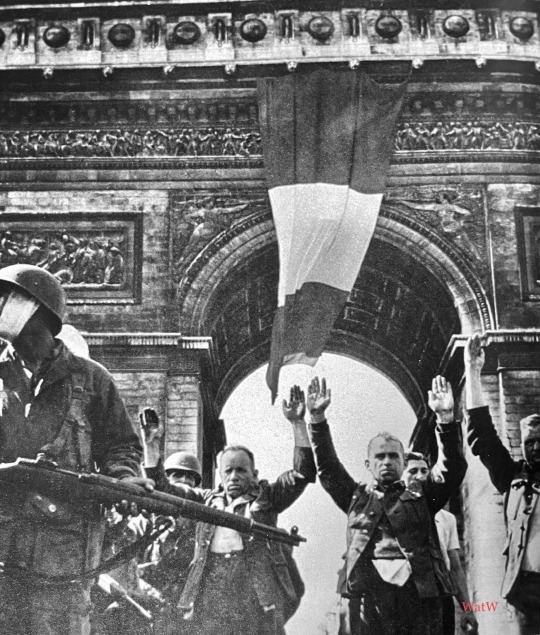
German POW’s are marched through the Arc de Triomphe by French soldiers after the liberation of Paris - 1944
#world war two#1940s#worldwar2photos#history#ww2 history#ww2#wwii#world war 2#ww2history#wwii era#arc de triomphe#liberation of paris#paris#France#1944#pow#prisoner of war
221 notes
·
View notes
Text
Oliver: goes to prison for 10 years in order to keep James safe and happy
James: *drowns himself*
#he said fuck it you can’t stop me#dude he went to prison for you wait a bit more#he’s alive in my heart#actually I think he may be alive for real#if we were villains#james farrow#oliver marks#james x oliver#the secret history#dead poets society#the atlas six#dark academia#donna tartt#books#booklover#reader
461 notes
·
View notes